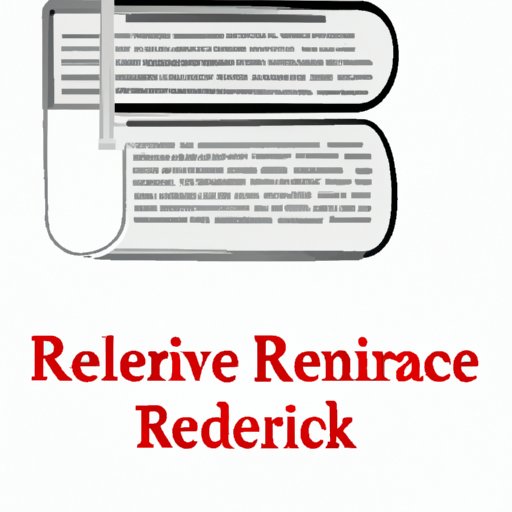Introduction
A literature review is a critical summary and analysis of existing research on a particular topic. It provides an overview of the current state of knowledge and identifies key areas that need further exploration. Literature reviews can be used in various academic disciplines, including the sciences, humanities, social sciences, and education.
In this article, we will explore why literature reviews are important and how they can be used to identify gaps in existing knowledge and research, generate new ideas, inform decision making, and develop new research projects.
How Literature Reviews Help to Identify Gaps in Existing Knowledge and Research
One of the most important reasons for conducting a literature review is to identify gaps in existing knowledge and research. By reading through existing research, you can gain a better understanding of what has already been done and what still needs to be explored.
When conducting a literature review, it is important to analyze the sources to determine if there are any gaps in the existing research. This involves looking for patterns or inconsistencies in the data and critically evaluating the quality of the sources. For example, a literature review may reveal that there is a lack of research on a particular topic or that most studies have used a certain methodology that could be improved upon.
By analyzing these gaps in existing knowledge and research, you can develop a research question or hypothesis that addresses the gap and provides a starting point for your own research.

Using Literature Reviews to Create a New Research Question or Hypothesis
Once you have identified the gaps in existing knowledge and research, you can use the literature review process to generate new ideas and form a research question or hypothesis. This involves examining the existing research from different angles and considering alternative interpretations of the data.
For example, a literature review may reveal that there is a lack of research on a particular topic. You can then use this information to develop a new research question or hypothesis that addresses the gap in existing knowledge. This can provide a starting point for your own research project and help you to focus your efforts.

The Importance of Referencing and Citing Sources
When conducting a literature review, it is important to properly reference and cite all sources that you use. This ensures accuracy and acknowledges other authors whose work you have used. It also helps to avoid plagiarism, which is the act of using someone else’s work without giving them credit.
When referencing sources, it is important to include the author, title, year of publication, and publisher for each source. You should also include page numbers when quoting directly from a source. Finally, you should use a consistent citation style throughout your literature review.
Showcasing How Literature Reviews Provide an Overview of Existing Research, Theories and Debates
Another important benefit of conducting a literature review is that it provides an overview of existing research, theories and debates on a particular topic. By reading through existing research, you can gain a better understanding of the current state of knowledge and identify areas where further exploration is needed.
When conducting a literature review, it is important to examine different theories and explore debates between researchers. This can help you to gain a deeper understanding of the topic and identify areas where further research is needed.
Demonstrating How Literature Reviews Can Be Used to Inform Decision Making
Literature reviews can also be used to inform decision making. By collecting relevant information from existing research, you can draw conclusions about the topic and make informed decisions. For example, a literature review may reveal that a particular policy is not effective and should be changed.
When conducting a literature review, it is important to consider multiple perspectives on the topic and take into account any potential biases. This ensures that the decision-making process is based on accurate and unbiased information.

Illustrating the Role of Literature Reviews in Developing New Research Projects
Finally, literature reviews can be used to develop new research projects. By examining existing research, you can establish a research framework and define the scope of the project. This helps to ensure that the research project is focused and relevant.
When developing a new research project, it is important to determine the appropriate methodology. A literature review can help to identify the most appropriate research design and data collection methods. This helps to ensure that the research project is well planned and structured.
Emphasizing the Value of Literature Reviews in Synthesizing Different Perspectives on a Topic
In addition to the benefits mentioned above, literature reviews can also be used to synthesize different perspectives on a topic. By comparing different views and examining opposing perspectives, you can gain a better understanding of the subject matter and integrate multiple points of view.
This is especially useful when researching controversial topics, as it allows you to examine both sides of the debate and draw your own conclusions. By synthesizing different perspectives, you can gain a more comprehensive understanding of the topic.
Conclusion
In conclusion, literature reviews are essential for identifying gaps in existing knowledge and research, generating new ideas, informing decision making, and developing new research projects. They can also be used to provide an overview of existing research, theories and debates, and synthesize different perspectives on a topic. As such, literature reviews play an important role in the research process.
Though conducting a literature review can be time-consuming, it is a valuable tool for gaining an understanding of a particular topic and identifying areas that need further exploration. For this reason, it is an essential part of the research process.
(Note: Is this article not meeting your expectations? Do you have knowledge or insights to share? Unlock new opportunities and expand your reach by joining our authors team. Click Registration to join us and share your expertise with our readers.)
